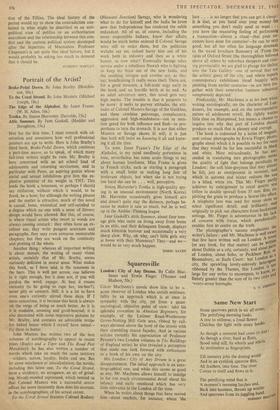Squaresville
COLIN MACINNES'S novels show him to be a, acute observer of London who avoids sentimen- tality by an approach which is at once in sympathy with the city, yet from a quasi- sociological, objective point of view: take his splendid evocation in Absolute Beginners, for example, of the Latimer Road-Westbourne Grove-Notting Hill Gate area, ribbed by rail- ways elevated above the level of the streets with their crumbling stucco façades. And in various articles (notably his appreciation of Professor Pevsner's two London volumes in The Buildings of England series) he also revealed a perception that made one look forward with enthusiasm to a book of his own on the city.
His London : City of Any Dream is a great disappointment. The initial approach is an auto- biographical one, and while this seems as good as any, Mr. Machines allows himself to indulge in far too much circumstantial detail about his infancy and early manhood which has very little relevance to the London of the time.
When he writes about things that have moved him—street markets, for instance, where 'the
SPECTATOR, DECEMBER 21, T962 lure . . . is no longer that you can get it cheap: it is that, as you hand over your money for something you don't really need or want . • • you have the reassuring feeling of performing a transaction—almost a ritual—that your an- cestors have done for centuries'—he can be verY good, but all too often his language descends to the travel brochure flummery of 'From the rains of Oxford Street (the thoroughfare beloved above all others by suburban shoppers and visit- ing provincials), we are glad to plunge for shelter into the Tate Gallery- one of several that are the artistic glory of the city, and where superb contemporary exhibitions blend happily with painting from earlier centuries—as are here (to- gether with their somewhat footsore admirers) sumptuously depicted.' Predictably, Mr. Macinnes is at his best when writing sociologically, on the character of Lon- doners, for example, and on the uncooperative nature of adolescent revolt. He rightly wastes little time on Hampstead, but misses a chance to inquire into why that part of London should produce so much that is phoney and corrupt. The book is redeemed by a series of magnifi- cent colour photographs by Erwin Fieger, photo- graphs about which it is possible to say for once that they would be far less successful in black and white. Most miraculously, he has suc- ceeded in translating into photographic terms the quality of light that belongs peculiarly to ' London: the soft blue-greyness that may almost. be felt, just as omnipresent in summer, and which in autumn and winter reduces the sun to a blind, white iris. This Mr. Fieger partly achieves by enlargement to royal quarto size (often in double spread) from 35 mm. film, ex- ploiting the grain to produce a Seurat-like effect. A telephoto lens was used for many shots to. select significant detail, and brilliantly originally to pick out characters from hackneyed settings. Mr. Fieger is adventurous in his lack of enables mn towi cthentfroecouns, thwehtircuhth. the paradoxically The photographer's success emphasises re writer's failure: and Mr. Maclnnes is well away that few have written well on London. A novel write n (or any book, for that matter) can be wri ..ts about Dublin as a city, certainly, and about Palor of London, about Soho, or Peckham Rlle' a Bloomsbury, or Earls Court: but London as city, the sprawling lovely-unlovely beteroginn ribboned by the Thames, this London is n, large for any writer to encompass, to know' i d finitely greater than the sum of its two cities an .wenty-seven boroughs.Jontis°N
i, s.




























 Previous page
Previous page